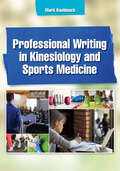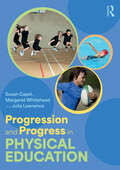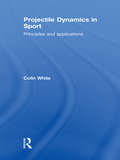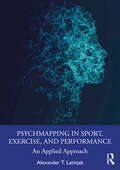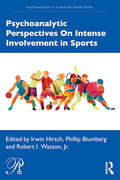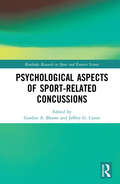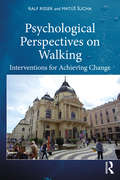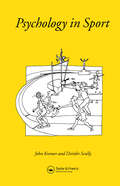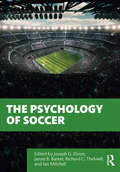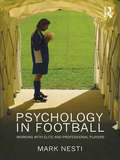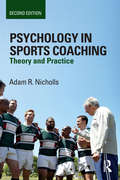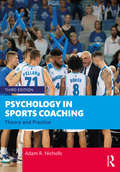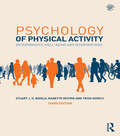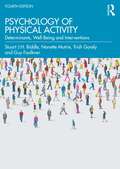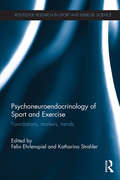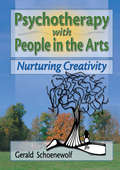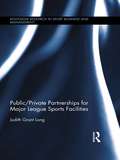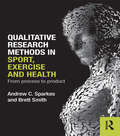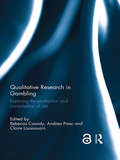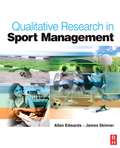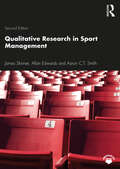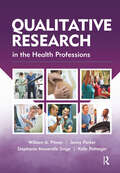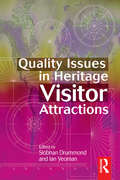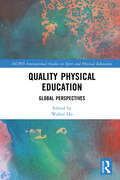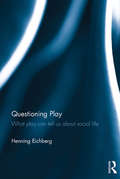- Table View
- List View
Professional Writing in Kinesiology and Sports Medicine
by Mark KnoblauchPublication of a research article can be a defining moment in a researcher’s career. However, the steps involved in turning an initial research question into a published article can be a long and arduous journey. To aid in this process, Professional Writing in Kinesiology and Sports Medicine was developed to serve as a comprehensive writing guide for research professionals and students who are looking to improve their academic writing skills. Dr. Mark Knoblauch and his 15 contributors developed Professional Writing in Kinesiology and Sports Medicine to focus around the area of manuscript development and presentation, while also including chapters that outline the foundational concepts of professional writing, developing a research grant, and the journal selection process. Each chapter is written by content experts who bring a wealth of experience not only from their own academic writing but also from having spent countless hours helping students become better, more effective writers. Many textbooks have been written that focus on development of the research manuscript itself, but what sets Professional Writing in Kinesiology and Sports Medicine apart is that it includes so much more to aid writers in their process.What you can find inside: Examination of ancillary aspects associated with academic research such as poster and oral presentations How to choose the most effective journal How to deal with the stress of writing How to write an effective grant Professional Writing in Kinesiology and Sports Medicine covers those topics and more, with the intent of providing a thorough, practical writing guide that spans the breadth of the research manuscript development, writing, and presentation process. Throughout the textbook, sample writings and cases relevant to the fields of kinesiology and sports medicine are used to provide the reader relevant, applicable examples to help improve their own writing.
Progression and Progress in Physical Education
by Margaret Whitehead Julia Lawrence Susan CapelHow well do I take account of the needs of different classes and individual learners to facilitate and enhance progress? Do I plan for progress based on where learners are currently at? Does the curriculum facilitate and enhance progress?Exploring these questions and more, this book examines what progress in physical education looks like and conditions for facilitating and enhancing the progress of individual learners across different domains of learning.Progression and Progress in Physical Education contains 12 units, each of which highlights an aspect of progression or progress in physical education. Throughout, the book emphasises that it is individual learners that make progress therefore highlighting the importance of catering for the holistic, individual learner. Grouped into four sections, units cover:- What is meant by progression, progress and learning?- The holistic nature of individual learners- The Physical, Cognitive and Affective Domains of learning- Teaching to facilitate and enhance progress- Recognising and charting progress- The role of the curriculum in facilitating and enhancing progress- The broader context in which physical education teachers workFilled throughout with examples of existing good practice and useful tips, this text will support all primary and secondary physical education teachers in facilitating and enhancing learner progress in physical education.
Projectile Dynamics in Sport: Principles and Applications
by Colin WhiteHow can we predict the trajectory of a baseball from bat to outfield? How do the dimples in a golf ball influence its flight from tee to pin? What forces determine the path of a soccer ball steered over a defensive wall by an elite player? An understanding of the physical processes involved in throwing, hitting, firing and releasing sporting projectiles is essential for a full understanding of the science that underpins sport. This is the first book to comprehensively examine those processes and to explain the factors governing the trajectories of sporting projectiles once they are set in motion. From a serve in tennis to the flight of a ’human projectile’ over a high jump bar, this book explains the universal physical and mathematical principles governing movement in sport, and then shows how those principles are applied in specific sporting contexts. Divided into two sections, addressing theory and application respectively, the book explores key concepts such as: friction, spin, drag, impact and bounce computer and mathematical modelling variable sensitivity the design of sports equipment materials science. Richly illustrated throughout, and containing a wealth of research data as well as worked equations and examples, this book is essential reading for all serious students of sports biomechanics, sports engineering, sports technology, sports equipment design and sports performance analysis.
PsychMapping in Sport, Exercise, and Performance: An Applied Approach
by Alexander T LatinjakUnderstanding why we act the way we do is key to fostering success. This book introduces PsychMapping, a unique model that visually and philosophically guides readers through the complexities of human behaviour. The holistic approach reveals how different psychological aspects interact and influence each other.The chapters follow the logic of the PsychMapping model, a map of all the key aspects in sport, exercise, and performance psychology. Each chapter is an opportunity for self-reflection and a perfect introduction for anyone interested in exploring the psychological aspects of human behaviour. Packed with practical experiences and real-world case studies, the book applies theories to life, making complex concepts accessible and actionable. A standout feature for professionals is the detailed self-reflection exercise, designed to enhance applied practice.PsychMapping in Sport, Exercise, and Performance is enriching for students, practitioners, and anyone eager to explore the psychological aspects of human behaviour.
Psychoanalytic Perspectives On Intense Involvement in Sports (Psychoanalysis in a New Key Book Series)
by Irwin HirschThis book is a unique volume that brings a variety of psychoanalytic perspectives to the study of sport. It highlights the importance of sports for different individuals and how the function and use of sports can be brought into the consulting room. Passionate interest in actively engaging in sports is a universal phenomenon. It is striking that this aspect of human life, prior to this volume, has received little attention in the literature of psychoanalysis. This edited volume is comprised largely of psychoanalysts who are themselves avidly involved with sports. It is suggested that intense involvement in sports prioritizes commitment and active engagement over passivity and that such involvement provides an emotionally tinged distraction from the various misfortunes of life. Indeed, the ups and downs in mood related to athletic victory or defeat often supplant, temporarily, matters in life that may be more personally urgent. Engaging in sports or rooting for teams provides a feeling of community and a sense of identification with like-minded others, even among those who are part of other communities and have sufficient communal identifications. This book offers a better psychoanalytic understanding of sports to help us discover more about ourselves, our patients and our culture, and will be of great interest to psychotherapists and psychoanalysts, or anyone with an interest in sport and its link to psychoanalysis and mental health.
Psychological Aspects of Sport-Related Concussions (Routledge Research in Sport and Exercise Science)
by Gordon A. Bloom Jeffrey G. CaronRecognition of concussion as a serious injury, informed by neurological and physiological research, is now commonplace in sport. However, research on the psychology of concussive injury—its psychological implications and outcomes, and psychological interventions for prevention and recovery—has largely been overlooked. This is the first book to explicitly and authoritatively set out the psychological aspects of sport-related concussion from a multidisciplinary and global perspective <P><P>The book attempts to offer a global understanding of the injury by presenting an historical overview; exploring the psychological implications of sport-related concussion and the influence of gender and sociocultural context on concussive injury and recovery; setting out practical guidance on working with special populations suffering from concussive injuries; and discussing the theoretical and methodological considerations for research on concussion and future directions for this research. <P><P>Written by a group of leading international experts and offering a hitherto underdeveloped perspective on this crucial area of sports injury research, this book is crucial reading for any upper-level student, researcher, sport scientist, coach, or allied health professional working on sport-related concussion. It is also valuable reading for students and researchers interested in the psychosocial processes that impact injury and recovery or general professional practice in sport psychology.
Psychological Perspectives on Walking: Interventions for Achieving Change
by Ralf Risser Matúš ŠuchaPsychological Perspectives on Walking provides a comprehensive overview of the benefits of walking and shows how we can encourage people to walk more based on psychological principles. It examines how walking significantly improves health, positively impacts the environment, contributes to resolving social issues, and boosts the local micro-economy. This pioneering book discusses psychological motivations for walking versus not walking and asserts research-based arguments in favour of walking, including both theoretical considerations and everyday concerns. The book investigates the motivations that can lead to increased walking, advises on how to build walking-conducive habits, and recommends strategies for decision makers for promoting changes that will allow walking to thrive more easily. The authors include success stories and lessons learned from what have become known as 'walkable' cities to show how interventions and initiatives can succeed on a practical basis. This accessible, practical book is essential for urban planners; health specialists; policy makers; traffic experts; psychology, civil engineering, and social sciences students; and experts in the field of sustainable mobility. Psychological Perspectives on Walking will appeal to anyone in the general population in favour of a sustainable and healthy lifestyle.
Psychology In Sport (Contemporary Psychology Ser.)
by John M.D Kreme Deirdre ScullyPsychology in Sport aims to bring sport psychology closer to the heart of mainstream psychology. John Kremer and Deirdre Scully take a new and refreshing look at the most recent sport psychology literature, presenting this information in a way which will be immediately recognisable to students of psychology. Written in a clear and engrossing style, this new approach to Psychology in sport will be of immediate relevance to courses on introductory, applied and sport psychology, as well as providing a valuable reference source for general psychological material pertaining to sport and exercise.
Psychology in Elite Soccer: More Than Just a Game
by Joseph G. DixonSports psychology; exploring the effects of psychological interventions on important performance-related outcomes, has become ever more popular and prevalent within elite level soccer clubs in the past decade as teams look to gain psychological as well as physiological advantages over their competitors. Psychology in Elite Soccer; More Than Just a Game seeks to present ta detailed understanding of the theories underpinning the psychological issues relating to soccer along with practical insights into effective psychological interventions and strategies This book uses contemporary theory and research to elucidate key concepts and applied interventions and will include world-leading expert commentaries of contemporary theoretical and applied approaches in understanding critical issues in soccer along with providing practical implications and insights into working effectively in soccer-related contexts. Psychology in Elite Soccer; More Than Just a Game is an evidence-based resource to guide research and facilitate practice and will be a vital resource for researchers, practitioners and coaches within the area of sport psychology and related disciplines.
Psychology in Football: Working with Elite and Professional Players
by Mark NestiHow can the skills of the sport psychologist be put to best use within a football club? How can a sport psychologist help elite footballers perform at their maximum level? In this groundbreaking guide to the role of the sport psychologist within elite and professional football, leading sport psychologist Mark Nesti argues that working closely with coaches and players to create a receptive environment is vital if psychologists are to add maximum value to team and individual performances. Drawing on a decade’s professional experience working at the top level of English football, Nesti offers a detailed guide to delivering sport psychology in an elite team sport environment, from practical drills on the training field to shaping organizational behaviour at club level. The book explores the full range of issues and themes that define the role of the professional sport psychologist working in football today, including: mental skills training group cohesion and team dynamics counselling, trust and confidentiality transitions in football managerial and coaching philosophies structure, communication and organizational psychology. The book is illustrated throughout with real-world case studies, drawing on research into sixteen professional clubs across five European countries, and concludes by suggesting how other elite team sports can learn from the experiences of professional football. This is the only book to outline a holistic approach to psychology in football and the to offer such a rich combination of theory and practice. It is therefore essential reading for all students of sport psychology and all psychologists and coaches working in elite team sport.
Psychology in Sports Coaching: Theory and Practice
by Adam R. NichollsSome of the most effective coaches understand the fundamentals of sport psychology, which include interacting effectively with athletes, creating the optimal environment, assessing the psychological needs of their athletes, and even providing them with the mental training required to maximise performance. Fully revised and updated, the second edition of Psychology in Sports Coaching: Theory and Practice clearly and accessibly introduces the principles and practice of sport psychology in the context of the coaching process. Drawing on the very latest research and theory, the book introduces the psychological tools and techniques that coaches can use to get the best performances out of their athletes. Including six new chapters on applying self-determination principles in coaching, creating the optimal motivational climate, increasing motivation, developing anti-doping attitudes, promoting challenge states, and mindfulness-based stress reduction training, the book also offers step-by-step guidance on key topics such as: Assessing the needs of athletes Facilitating awareness through goal-setting and performance profiling Working with special populations, including children and injured athletes Building team cohesion Maximising relationships and socially supporting athletes Teaching mental skills such as imagery and coping Building mental toughness and confidence. Every chapter contains useful features to aid learning and understanding, including in-depth case studies, critical thinking questions, clear and concise summaries, and practice exam questions. Psychology in Sports Coaching: Theory and Practice is essential reading for any student of sports coaching or any practising coach looking to extend and develop their skills, and useful applied reading for students of sport psychology.
Psychology in Sports Coaching: Theory and Practice
by Adam R. NichollsThe most effective coaches understand the fundamentals of sport psychology, which include interacting effectively with athletes, creating the optimal environment, assessing the psychological needs of their athletes, and providing them with the mental training required to maximise performance. Fully revised and updated, the third edition of Psychology in Sports Coaching clearly and accessibly introduces the principles and practice of sport psychology in the context of the coaching process. Drawing on the very latest research and theory, the book introduces the psychological tools and techniques that coaches can use to get the best performances out of their athletes. Including three new chapters on the constraints approach to assessing psychological needs, mental imagery, managing perfectionism tendencies, and mentoring leaders, the book also offers step-by-step guidance on key topics such as: Assessing the needs of athletes Facilitating awareness through goal setting and performance profiling Coaching specialist populations effectively (e.g. children, adolescents, adults and athletes with learning disabilities) Reducing favourable attitudes towards doping Developing effective coach-athlete relationships Reducing choking under pressure Mindfulness techniques Mental imagery Every chapter contains useful features to aid learning and understanding, including in-depth case studies, critical thinking questions, clear and concise summaries, and practice exam questions. Psychology in Sports Coaching is essential reading for any student of sports coaching, or any practising coach looking to extend and develop their skills, and useful applied reading for students of sport psychology.
Psychology of Physical Activity: Determinants, Well-Being and Interventions
by Stuart J. Biddle Nanette Mutrie Trish GorelyThe positive benefits of physical activity for physical and mental health are now widely acknowledged, yet levels of physical inactivity continue to increase throughout the developed world. Understanding the psychology of physical activity has therefore become an important concern for scientists, health professionals and policy-makers alike. Psychology of Physical Activity is a comprehensive and in-depth introduction to the fundamentals of exercise psychology, from theories of motivation and adherence to the design of successful interventions for increasing participation. Now in a fully revised, updated and expanded third edition, Psychology of Physical Activity is still the only textbook to offer a full survey of the evidence-base for theory and practice in exercise psychology, and the only textbook that explains how to interpret the quality of the research evidence. With international cases, examples and data included throughout, the book also provides a thoroughly detailed examination of the relationship between physical activity and mental health. A full companion website offers useful features to help students and lecturers get the most out of the book during their course, including multiple-choice revision questions, PowerPoint slides and a test bank of additional learning activities. Psychology of Physical Activity is the most authoritative, engaging and up-to-date introduction to exercise psychology currently available. It is essential reading for all students working in exercise and health sciences.
Psychology of Physical Activity: Determinants, Well-Being and Interventions
by Stuart J. Biddle Nanette Mutrie Trish Gorely Guy FaulknerThe positive benefits of physical activity for physical and mental health are now widely acknowledged, yet levels of physical inactivity continue to be a major concern throughout the world. Understanding the psychology of physical activity has therefore become an important issue for scientists, health professionals and policy-makers alike as they address the challenge of behaviour change. Psychology of Physical Activity provides comprehensive and in-depth coverage of the fundamentals of exercise psychology, from mental health, to theories of motivation and adherence, and to the design of successful interventions for increasing participation. Now publishing in a fully revised, updated and expanded fourth edition, Psychology of Physical Activity is still the only textbook to offer a full survey of the evidence base for theory and practice in exercise psychology, and the only textbook that explains how to interpret the quality of the research evidence. As the field continues to grow rapidly, the new edition expands the behavioural science content of numerous important topics, including physical activity and cognitive functioning, automatic and affective frameworks for understanding physical activity involvement, new interventions designed to increase physical activity (including use of new technologies), and sedentary behaviour. A full companion website offers useful features to help students and lecturers get the most out of the book during their course, including multiple-choice revision questions, PowerPoint slides and a test bank of additional learning activities. Psychology of Physical Activity is the most authoritative, engaging and up-to-date book on exercise psychology currently available. It is essential reading for all students working in behavioural medicine, as well as the exercise and health sciences.
Psychoneuroendocrinology of Sport and Exercise: Foundations, Markers, Trends (Routledge Research in Sport and Exercise Science)
by Felix Ehrlenspiel Katharina StrahlerPsychoneuroendocrinology is the study of the interaction between hormones, the brain and human behaviour. This is the first book to examine psychoneuroendocrinology in the context of sport and exercise, offering a comprehensive review of current research and assessment techniques and highlighting directions for future research. The book explores the links between hormones and behaviour, and draws important conclusions for how their study will aid in the understanding of the bidirectional link between sport and behaviour, central to the psychology of sport and exercise. It presents the key hormones that underpin behaviour in a sporting context, including the description of their physiologic mechanisms and behavioural effects. The book reports benchmark standards for the assessment and analysis of hormonal influences of behaviour in sport, and examines practical issues and contexts such as emotional state, overtraining and stress. Psychoneuroendocrinology in Sport and Exercise is a breakthrough text that will be of interest to all advanced students and researchers working in the psychology and physiology of sport and exercise.
Psychotherapy with People in the Arts: Nurturing Creativity
by Terry S Trepper Gerald SchoenewolfLearn to free creativity from the shackles of emotional conflicts!This riveting collection of case histories illustrates the dark interplay of neurosis and creativity. Psychotherapy with People in the Arts explores the struggles of writers, painters, actors, and composers to reconcile their overwhelming need to create and the self-doubts, frustrations, and neuroses that block their potential. In addition to ten inspiring tales of healing and self-knowledge, Psychotherapy with People in the Arts provides a solid introduction to the primary issues related to emotional disorders and creativity. It begins with a study of the notoriously reclusive and eccentric writer J. D. Salinger. Using both theory and case example, it shows how family history, present relations, and genetics can combine to impede the flow of an artist&’s natural gifts-and how a good therapist can help unblock that creative power. It also includes a series of tests to diagnose blocked creativity. Psychotherapy with People in the Arts explores such compelling themes as: dealing with racism and internalized self-hatred the conflict between commercial and high art anger and blocked tears the drive for an impossible perfection emotional alienation and sexual acting outPsychotherapy with People in the Arts is a fascinating look at a complex and controversial subject. Though not everyone is a professional artist, every human being has creative potential that can be blocked by emotional disturbances. And every therapist, mental health educator, and artist will find rich sources of information and inspiration in this book. Visit the author's website at http://www.livingcenter.net
Public-Private Partnerships for Major League Sports Facilities (Routledge Research in Sport Business and Management)
by Judith Grant LongThis volume takes readers inside the high-stakes game of public-private partnerships for major league sports facilities, explaining why some cities made better deals than others, assessing the best practices and common pitfalls in deal structuring and facility leases, as well as highlighting important differences across markets, leagues, facility types, public actors, subsidy delivery mechanisms, and urban development aspirations. It concludes with speculations about the next round of facility replacement amidst rapid changes in broadcast technology, shrinking domestic audiences, and the globalization of sport.
Qualitative Research Methods in Sport, Exercise and Health: From Process to Product
by Andrew C. Sparkes Brett SmithQualitative forms of inquiry are a dynamic and exciting area within contemporary research in sport, exercise and health. Students and researchers at all levels are now expected to understand qualitative approaches and be able to employ them in their work. In this comprehensive and in-depth introductory text, Andrew C. Sparkes and Brett Smith take the reader on a journey through the entire qualitative research process that begins with the conceptualization of ideas and the planning of a study, moves through the phases of data collection and analysis, and then explains how findings might be represented in various ways to different audiences. Ethical issues are also explored in detail, as well as the ways that the goodness of qualitative research might be judged by its consumers. The book is based on the view that researchers need to make principled, informed and strategic decisions about what, why, when, and how to use qualitative forms of inquiry. The nature of qualitative research is explained in terms of both its core assumptions and what practitioners actually do in the field when they collect data and subject it to analysis. Each chapter is vividly illustrated with cases and examples from published research, to demonstrate different qualitative approaches in action and their relative strengths and weaknesses. The book also extends the boundaries of qualitative research by exploring innovative contemporary methodologies and novel ways to report research findings. Qualitative Research Methods in Sport, Exercise and Health is essential reading for any student, researcher or professional who wishes to understand this form of inquiry and to engage in a research project within a sport, exercise or health context.
Qualitative Research in Gambling: Exploring the production and consumption of risk
by Rebecca Cassidy Andrea Pisac Claire LoussouarnThe Open Access version of this book, available at http://www.tandfebooks.com, has been made available under a Creative Commons Attribution-Non Commercial-No Derivatives 3.0 license. Gambling is both a multi-billion-dollar international industry and a ubiquitous social and cultural phenomenon. It is also undergoing significant change, with new products and technologies, regulatory models, changing public attitudes and the sheer scale of the gambling enterprise necessitating innovative and mixed methodologies that are flexible, responsive and ‘agile’. This book seeks to demonstrate that researchers should look beyond the existing disciplinary territory and the dominant paradigm of ‘problem gambling’ in order to follow those changes across territorial, political, technical, regulatory and conceptual boundaries. The book draws on cutting-edge qualitative work in disciplines including geography, organisational studies, sociology, East Asian studies and anthropology to explore the production and consumption of risk, risky places, risk technologies, the gambling industry and connections between gambling and other kinds of speculation such as financial derivatives. In doing so it addresses some of the most important issues in contemporary social science, including: the challenges of studying deterritorialised social phenomena; globalising technologies and local markets; regulation as it operates across local, regional and international scales; and the rise of games, virtual worlds and social media.
Qualitative Research in Sport Management
by James Skinner Allan EdwardsQualitative Research in Sport Management is the first book of its kind to bring together valuable research designs based on extensive research in qualitative research methods across a number of different fields. Research designs from the fields of business, education, cultural studies, media studies, queer studies, sociology and psychology are applied specifically to sport management, taking into account the special features and nuances of this field. In each research design the text provides a concise guide to how each model can first be applied to sport management issues and problems, second, strengthen the research design, and finally, enhance the research process. Each chapter is carefully structured to ensure that key information is easy to locate and remember and includes: Introduction, Objectives, Key Concepts and Terms, and Review and research questions. International case studies, "In Profile" sections with leading sport management researchers and research briefs are used to illustrate how theory is put into practice. An accompanying website provides powerpoint summaries of each chapter. Please visit: www.textbooks.elsevier.com/9780750685986.
Qualitative Research in Sport Management
by James Skinner Allan Edwards Aaron C.T. SmithGood qualitative research can help sport management researchers and industry professionals solve difficult problems and better understand their organisations, stakeholders and performance. Now in a fully revised and extended new edition, this book is a user-friendly introduction to qualitative methods in sport management. Covering the full research process from research planning to reporting results, this edition includes expanded coverage of cutting-edge areas including digital and social media research, critical realism, and social network analysis. The book examines the reflective and interrogative processes required for developing effective qualitative research questions and includes a deeper discussion of ontology and epistemology in the light of today’s rapidly changing society. It takes the reader step-by-step through essential and emerging qualitative methods, from actor network theory and ethnography to computer-assisted data analysis and sampling typologies. Every chapter includes examples of real qualitative research, including shorter "research briefs" and extended case studies, reflecting the exciting qualitative research that is currently occurring in sport business and management, and highlighting the links between research and sport management practice. This is essential reading for courses in sport management, sport business, sport policy, sport marketing, sport media, and communications. It provides students, researchers, and practitioners with the knowledge and skills to undertake qualitative research while deepening their understanding of how the social world can be perceived and interpreted through a particular theoretical lens. Useful online materials include recommended readings and PowerPoint slides.
Qualitative Research in the Health Professions
by William Pitney Jenny Parker Stephanie Mazerolle Kelly PotteigerQualitative research can provide a great depth of understanding for health professionals in practice. Although many general research texts used in health discipline research courses present a broad spectrum of research methods, their discussion of qualitative methods is often limited. Qualitative Research in the Health Professions by Drs. William A. Pitney, Jenny Parker, Stephanie M. Mazerolle, and Kelly Potteiger, is a practical and straightforward text for those learning about qualitative research in the health professions. In Qualitative Research in the Health Professions, readers will acquire skills in mastering:• Introductory concepts of qualitative research, how it compares to quantitative research, and how to conceptualize a qualitative study • How to conduct a qualitative research study and present findings, including sections on collecting and analyzing data, ensuring trustworthiness of the data, and attending to ethical issues • Advanced concepts including various forms of qualitative research, how to mix quantitative and qualitative methods, and how to evaluate qualitative research Each chapter includes activities and exercises to further students’ understanding and the text also includes personal commentaries from scholarly practitioners in various health professions underscoring the value and importance of qualitative research. Qualitative Research in the Health Professionswill help current and future practitioners master the principles of qualitative research, understand published qualitative studies, and apply these findings in furthering evidence-based practice.
Quality Issues in Heritage Visitor Attractions
by Ian Yeoman* Quality as a tool for success*Covers a diverse range of quality issues and theories in the context of heritage attractions* Well-respected international contributor team of academics and practitionersHeritage Tourism is the fastest growing component of the tourism market. Tourists have more choices than ever and their past experiences and future expectations make them even more discerning customers. A focus on quality can assist with customer satisfaction and business excellence. This new book on Quality issues brings together a range of specialists who lead us from the evolution of quality to our current position on the quality roadmap. It provides a toolkit to assist on the continuous quality improvement journey and presents a vision of what lies ahead in this new millennium.'Quality Issues in Heritage Visitor Attractions' will prove an invaluable guide for students and practitioners in the field s of Heritage, Visitor Attractions and Tourism in general.Divided into six sections this text presents a different 'flavour' of quality by looking at aspects such as critical success factors for heritage organizations, methods of quality improvement, developing the concept and offering, quality tools for managers, managing the quality workforce and the future.
Quality Physical Education: Global Perspectives (ISCPES International Studies in Sport and Physical Education)
by Walter HoThis book represents the culmination of a two-decade effort to describe, define and measure ‘quality physical education’ (QPE). Presenting in-depth research and analysis from 24 countries across five continents, it offers a truly comparative analysis that shines important new light on policy and practice in contemporary physical education.Opening with an introduction that explores the concept of ‘quality’ in relation to education and that traces the history of the QPE project, the book then presentscountry-specific chapters that drill down into the evidence. Each chapter outlines the geographical, political, economic, cultural and demographic background of that country, and analyses the development of physical education, sport education and school-based physical activity, as well as the contemporary situation regarding equity, teaching quality, professional training and curriculum development. Each chapter then offers an assessment of the eight factors that constitute the QPE index, including skill development, facilities, accessibility, cultural practices, governmental input, cognitive skill development and habituated behaviour.With a global reach, this book is an invaluable resource for policymakers, curriculum coordinators, administrators, teachers and researchers looking to better understand the enablers and barriers to developing QPE and to develop evidence-based strategies and interventions for promoting and implementing QPE.
Questioning Play: What play can tell us about social life
by Henning EichbergWhat is play? Why do we play? What can play teach us about our life as social beings? In this critical investigation into the significance of play, Henning Eichberg argues that through play we can ask questions about the world, others and ourselves. Playing a game and asking a question are two forms of human practice that are fundamentally connected. This book presents a practice-based philosophical approach to understanding play that begins with empirical study, drawing on historical, sociological and anthropological investigations of play in the real world, from contemporary Danish soccer to war games and folk dances. Its ten chapters explore topics such as: play as a practice of search playing, learning and progress the light and dark sides of play playing games, sport and display folk sports, popular games, and social identity play under the conditions of alienation. From these explorations emerge a phenomenological approach to understanding play and its value in interrogating ourselves and our social worlds. This book offers a challenging contribution to the interdisciplinary field of the philosophy of play. It will be fascinating reading for any student or researcher interested in social and cultural anthropology, phenomenology, and critical sociology as well as the ethics and philosophy of sport, leisure studies, and the sociology of sport. .
